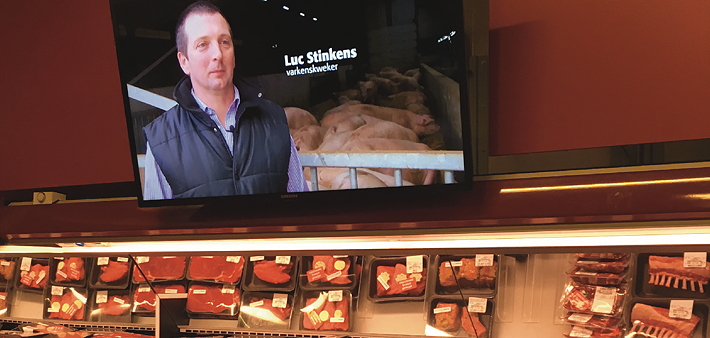Pig producers in the UK are in danger of losing their high-welfare reputation as the rest of Europe moves to end surgical castration, according to Zoetis. The firm expects the take up of its boar taint vaccine to accelerate as the benefits become better understood, and judging by the experience of pig producers, retailers and consumers in Belgium, there’s no downside.
Addressing a group of UK pig sector representatives on a recent visit to that country, Zoetis’ Ben Lacey said that while the production of entires in the UK had improved the welfare of pigs, and had arguably resulted in a price premium, it had also had a detrimental effect on meat quality. With several EU countries now aiming at phasing out surgical castration in the next couple of years, the UK would lose the welfare advantage, and as Continental producers would be unwilling to risk their export markets by compromising meat quality, Improvac was becoming their most likely solution.
It wouldn’t happen here: the meat cabinet shown above at a Belgian Colruyt supermarket runs a video explaining where its pigmeat comes from and how it’s produced
This would be a problem for UK farmers, Mr Lacey added, because there were other welfare benefits from using Improvac. It reduced aggressive and sexual behaviour at the late finishing stage – reducing lameness and injuries, and associated mortality – and also reduced the number of gilt pregnancies where mixed-sex finishing was practiced.
Compared to surgical castration, using Improvac offered pig producers the opportunity to improve welfare, improve eating quality and improve profitability too, as the pigs grew more quickly in the final four-to-six weeks of finishing, after receiving the second of their two vaccination shots.
Retail acceptance
Belgium’s largest supermarket chain, Colruyt, switched to sourcing pork solely from Improvac-treated herds in 2010, just a year after the vaccine was approved for use in the EU. The firm wanted its producers to move away from conventional surgical castration, but carried out tests – that included blind tastings in stores – on the alternative. Meat was trialled from entires, from pigs castrated using painkillers, pigs castrated using CO2 anaesthesia and pigs vaccinated with Improvac – with the Zoetis treatment winning through.
In its press release announcing the move, Colruyt wasn’t only able to say it had ended castration, but could claim lower mortality and lower antimicrobial use by its producers, and more tender and juicier meat too.
It’s a position Zoetis would like to reach with the UK’s major retailers too, although as yet there’s too much resistance (except when it comes to imports, where it’s suspected they take a don’t ask/don’t tell approach). Nevertheless, the animal health company has a clear goal in mind: “That Improvac can be prescribed by vets and used by farmers where the need exists with no restriction on use by retailers or assurance schemes”.
With UK pork consumption falling, you’d think a boost to demand through improved meat quality would be more widely welcomed, but so far there’s been little appetite for change. Other than, that is, among niche producers focusing on meat quality and better welfare.
In fact, there were approximately 20,000 boars treated with Improvac in the UK in 2015, but unless you happened to buy some meat from one of the producers taking advantage of this technology – or chanced upon some treated Belgian pork – you’re unlikely to have enjoyed the benefits!
See COMMENT: How about making Improvac a point of differentiation?




